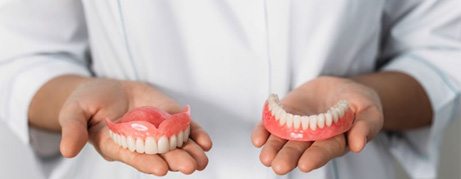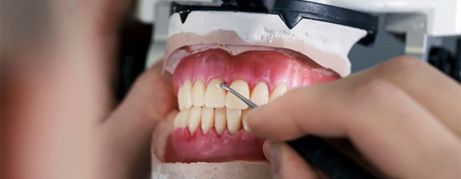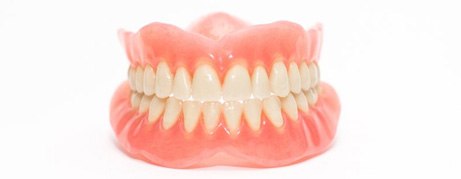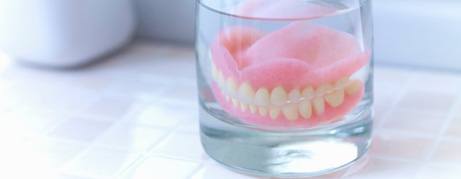Dentures – Commack, NY
Getting Your Full Grin Back
It can be hard to deal with tooth loss. That much is natural – even a few missing teeth can ruin your looks and oral health. Still, you don’t need to live with smile gaps. A much better idea is to get dentures in Commack! Using these prosthetics, our own Dr. Silfa can restore your smile and improve your life. We’re happy to tell you more if you want. To that end, please keep reading or book a visit to our office.

Who’s a Good Candidate for Dentures?

It doesn’t take much to qualify for dentures. Most patients with tooth loss serve as good treatment candidates. However, not everyone with missing teeth is suited for dentures. During your consultation with us, we will examine your smile to determine if dentures are the right tooth replacement option for you. Until then, here are some things to take into consideration.
The Effects of Missing Teeth

Teeth are incredibly strong! In fact, tooth enamel is the strongest substance in the entire body. It’s even stronger than bone! However, it isn’t completely indescribable. Teeth can become damaged beyond repair in a variety of ways, the most common being tooth decay, gum disease, and trauma to the mouth. According to the American Academy of Periodontology, there are many negative effects of tooth loss, including facial sugging, difficulty speaking, difficulty eating, and low self-confidence. When you replace your missing teeth with dentures, you can improve all of these things, therefore improving your overall quality of life.
What Qualifies You for Dentures?

Dentures are great for those who are missing multiple, most of, or all of their teeth. Depending on the number of teeth you are missing and where they are located, we will put together a custom plan just for you. If you currently have other oral health issues, like gum disease or tooth decay, this will need to be addressed and eliminated before we can move forward in the dentures process.
Alternative Tooth Replacement Options

If dentures don’t sound like your thing, or you don’t make a good candidate for dentures, you might want to consider other tooth replacement options. Here is how they work:
- Dental Bridges: A dental bridge works by “bridging” the gap with a replacement tooth using dental crowns on the adjacent teeth. This is good for patients who are only missing one or a few teeth. This method requires healthy teeth surrounding the missing one(s) to support it.
- Dental Implants: A dental implant is a screw-like post that is surgically inserted into the jawbone to support a replacement tooth. This requires that the patient has a strong and sufficient jawbone structure. This option is more costly than dentures, but it is intended to last for a lifetime.
Learn More About Dental Bridges
Learn More About Dental Implants
Types of Dentures

We’ll outline what to expect from treatment at your consultation. To be specific, our staff will suggest you get one of three possible dentures:
Partial Dentures
A partial denture only replaces a few of your teeth. So, it fits onto your gumline with suction or clasps that connect to other pearly whites. The appliance ensures seamless results by using a pink-colored acrylic base. Though a poorly-made base can feel loose, this component is customized for a snug fit.
Full Dentures
In contrast to partial ones, full dentures replace whole arches of teeth. Each one uses suction to keep itself on your upper or lower arch. To that extent, a full denture won’t clasp onto any remaining natural teeth.
Of course, the materials of a full denture are similar to those of partials. The former also uses acrylic, gum-colored resin for its base.
Implant Dentures
Implant dentures (per their name) attach to dental implants. These latter restorations slowly fuse with your jawbone. Given this fact, implant dentures are very secure and stable. They won’t slip around in your mouth like standard ones might.
If you prefer non-traditional restorations, implant dentures will serve you well. They remain stable and unmoving.
How Dentures Are Made

Have you ever wondered about the process for making dentures? The exact steps can vary from case to case, but the overall process is basically the same. Essentially, we carefully design each prosthetic and coordinate with a dental lab to make sure that the final product is both beautiful and functional. Continue reading below to discover more details about how dentures are made. What you learn might just enhance your appreciation for your restored smile!
What Are Dentures Made Of?

Each denture has two main parts:
- The gum-colored base of dentures is usually made of acrylic, a material that tends to sit comfortably against the gum tissue. In partial dentures, the acrylic base has small acrylic or metal attachments that help it to stay in place. In some cases, nylon or other materials are used in place of acrylic.
- The teeth of dentures are usually made of either acrylic resin or porcelain. Usually, porcelain is the material of choice for full-mouth replacement, whereas acrylic is often better for partial restorations.
The Denture Creation Process

The denture creation process involves a number of steps:
- First, we take detailed impressions of your mouth. You bite into a soft putty-like material, and we use the impression to create a plaster model of your mouth. We may also take some measurements of your jaw.
- The plaster cast is sent to a dental laboratory. They create a wax version of your gumline and use a machine known as an articulator to place artificial teeth within the wax.
- You come in for a fitting. We make notes on how the wax denture fits and feels in your mouth. We then send the wax-up back to the laboratory so they can continue to work on your final prosthetic. If necessary, you will come in for additional fittings.
- When the final denture is ready, we will make any necessary minor adjustments and give you some tips on how to care for it. Then, you can go enjoy your new smile!
Adjusting to Your New Dentures

It can take up to a month or longer to adapt to new dentures. At first, your prosthetic might feel a bit uncomfortable. Your speech and chewing ability might not be what you hoped. As you practice using your denture, however, it should become easier and easier to use. In fact, it should eventually feel like a natural extension of your body! If you have any questions or concerns during the adjustment process, call our team so we can render assistance.
Benefits of Dentures

Missing teeth are a drain both physically and mentally, making it difficult to do even small tasks like eating your favorite foods or socializing with loved ones. For those suffering from this constant fatigue, a denture from Silfa Dental can be life changing Whether you’ve lost several teeth or all of them in an arch, a good denture can give you back your smile and your quality of life. If you’re curious about other benefits you can gain from a dental prosthetic, read more below!
Psychological Benefits

Aging can be a hard process to cope with on its own but pairing that with tooth loss can strike a severe blow to confidence and self-esteem. As a result, patients who lose multiple teeth tend to withdraw both socially and emotionally from others. This can create a negative feedback loop that leads to depression, anxiety, and isolation—even from family members and close friends.
With a denture, you can stop yourself from following these trends by restoring the look and function of your smile. By renewing your whole self-image, you’ll have more desire to engage with those who matter most and laugh more often.
Clearer Enunciation

Your teeth play a vital role in your ability to speak and be understood. The placement of your tongue and structure of your lips and cheeks can make a huge difference in creating certain sounds and syllables. A denture from Dr. Silfa replaces missing teeth that are important to your speech and acts as a stabilizer for your soft facial tissues.
Improves Nutrition

Your teeth are the first and most important part of digestion. They break down food so that your body can process it properly. When you’re missing multiple teeth, chewing wholesome foods becomes more difficult. Without being thoroughly worked into a digestible state, your body can react negatively through indigestion, reflux, and other stomach problems. A denture restores this important function of your teeth, allowing you to enjoy nutritious food without consequences.
Preserves Oral Health

A denture can also help keep your oral health intact. For instance, if you have any remaining teeth, a partial denture can keep them from shifting. This prevents future bite issues caused by misalignment. The prosthetic can also help evenly distribute biting forces along your dental arches, decreasing the wear and tear of chewing on your pearly whites over time.
Expands Opportunities

Whenever you meet someone new, one of the first things they’ll notice about you is your smile. Depending on your career goals, a great grin might even be necessary to fill a front-facing role in sales or customer service. Employers are always looking for positive and well-kempt people to promote and serve as examples in their organizations. A clean, dazzling denture could make all the difference in your next interview or networking opportunity!
Understanding the Cost of Dentures

Dentures are a lifechanging tooth replacement options. They can restore that appearance and function of your smile. Since dentures are customized for each patient, the cost can vary on multiple different factors. During your consultation with us, we will go over the estimated cost of your treatment in detail. Until then, here are some things to take into consideration.
Factors That Affect the Cost of Dentures

There are multiple factors that play a role in the cost of your dentures. Here are some of the most important ones.
- Preparation: If you require preliminary procedures, like gum disease treatment or tooth extractions, you should consider these costs as well.
- Material: Dentures can be crafted from multiple materials. They are all set at different price points.
- Type of Denture: In most cases, the bigger the prosthetic, the higher the cost. Implant dentures are priced higher because they require a surgical procedure.
Are Implant Dentures More Expensive?

Implant dentures have a higher cost than traditional dentures, and there is a good reason for this. Instead of being supported by the shape and suction of the mouth, implant dentures are supported by several strategically placed dental implants throughout the jawbone. This allows for additional stability, comfort, and longevity. To achieve this, getting dental implants requires a surgical procedure and many months of healing, making this cost higher. Implant dentures are made to last for multiple decades or even the rest of your life!
Does Dental Insurance Cover Dentures?

Most dental insurance providers consider dentures to be a major restorative procedure. This means that they are often covered up to 50% after your deductible has been met and before you have exceeded your maximum. However, every plan is a little bit different, so it is best to reach out to your provider directly so that you don’t run into any surprises.
Other Options for Making Dentures Affordable

If you don’t have dental insurance, this doesn’t mean that you are completely out of luck. With our In-House Loyalty Membership, patients can receive discounts on treatments completed at our practice. We are also proud to accept payments through Proceed Finance, LendingPoint, Cherry, and CareCredit. These third-party financing companies can split the cost of your treatment into manageable monthly installments with little to no interest. If you have questions or need help applying, don’t hesitate to let us know.
Dentures Aftercare

Receiving a pair of dentures can transform your smile into a beautiful and functional new state. While some denture patients may be tempted to think that they won’t need to see the dentist if they have no remaining natural teeth, nothing could be farther from the truth. It’s still important to see your dentist when wearing dentures so they can monitor your oral health, watch out for any abnormalities like oral cancer, and ensure that your dentures fit well. Through early detection, your dentist can save you from costly restorative treatments later on.
Removable Dentures

Remove After Eating

After each meal, take your dentures out and rinse them with cold or lukewarm water to prevent plaque or food debris from accumulating on their surface. This will prevent oral infections caused by harmful oral bacteria such as gum disease as well as prevent irritation resulting from food caught between the appliance and the gums. Never use hot water, as this can cause your dentures to warp, potentially ruining their fit or even causing them to break.
Clean Your Restoration

Your dentures require regular maintenance to work properly. After removing them, use a soft-bristled toothbrush and a small amount of mild dish soap, unscented hand soap, or an approved denture cleanser to gently polish their surfaces. Regular toothpaste is too abrasive for dentures and can leave unsightly scratches in the crowns and the acrylic bases over time. Dentures need to stay moist to prevent warping, so soak them in water or denture-cleansing solution if you’re not putting them back in right away. Always thoroughly rinse your dentures after soaking, as these cleansing products are not safe to swallow.
Keep Your Dentures Safe

How you handle your dentures can make all the difference in how long they can last. Whenever you remove them for cleaning, place folded towels across the surface of your countertop and fill the sink with lukewarm water to create a cushion in case you drop them. It’s also important to keep your restoration out of the reach of pets and small children who may want to play with or chew on it.
Remove Dentures When You Sleep

It’s important to remove and soak your dentures before you go to bed to give your mouth a chance to rest and clean itself while preventing your appliance from drying out. Wearing dentures reduces circulation in your gums, meaning that it can lead to soft-tissue irritation or infections if it goes on too long. Wearing them continuously can also allow plaque and bacteria to accumulate, which can lead to a higher risk of pneumonia.
Notice Changes

Pay attention to the state of your mouth and your dentures. If you notice issues such as sores, gum irritation, or signs of infection, bring them to your dentist’s attention. If your dentures have been damaged, trying to repair them on your own may simply damage them further, so it’s important to only have them repaired by a qualified dentist. If your dentures are sliding about in the mouth, making clicking noises, or seeming to not fit properly, tell your dentist, as they may need to be relined or replaced.
Dentures FAQs
Can I Sleep with My Dentures?
When you first receive your dentures, you may be instructed to leave them in for twenty-four hours afterward, but it’s important to remove them every day afterward. Most dentists recommend removing your dentures before you go to bed to give your mouth time to rest and clean itself. Since wearing dentures restricts blood flow to the gums, wearing them continuously can cause soft tissue irritation and bone loss in the jaws. Wearing your dentures for too long also allows bacteria to accumulate under your appliance, which increases your gum and tongue plaque as well as your risk of developing pneumonia.
What Is the Average Age for Dentures?
While tooth loss is not inevitable in most cases, it becomes far more likely with age. While 33% of adults between the ages of 20 and 39 have lost at least one tooth, 66% of adults between the ages of 40 and 64 deal with the same problem, making you more likely to need a partial denture after 40. The American Dental Association reports that nearly 57% of patients between the ages of 65 and 74 wear some type of denture. However, while people are more likely to need false teeth at older ages, adults of any age may be suitable candidates for dentures.
What Qualifies You for Dentures?
Dentures come in three varieties: partial dentures, full dentures, and implant dentures, and each one comes with different criteria. Partial dentures are probably best for people who have only lost a few teeth, perhaps due to injury, infection, or malnutrition. Full dentures are generally recommended for patients who have lost all of their teeth or who have no healthy teeth worth salvaging. This sort of extensive tooth loss may result from bone loss, severe gum disease, or another advanced oral health problem. Implant dentures are attached to dental implants to create a superior hold and leverage, but they require the patient to have adequate bone mass in their jaws. If your jawbone is currently insufficient to host implants, you may be able to restore its bone density with bone grafts and receive them later.
Will It Hurt to Get Dentures?
If you require tooth extractions before receiving dentures, you will probably experience some discomfort after surgery, but this can be addressed with your prescribed pain medication and should improve within three to five days afterward. It may take some time to get used to wearing dentures, and you may experience some irritation during the process. The duration of this discomfort varies from person to person, and it can take months in many cases. If your dentures have recently been replaced, the adjustment period to the new set may take longer than the previous one. If the pain is not getting better, call your dentist as soon as possible. It may be because your dentures don’t fit properly or due to an underlying oral health issue that requires treatment.





